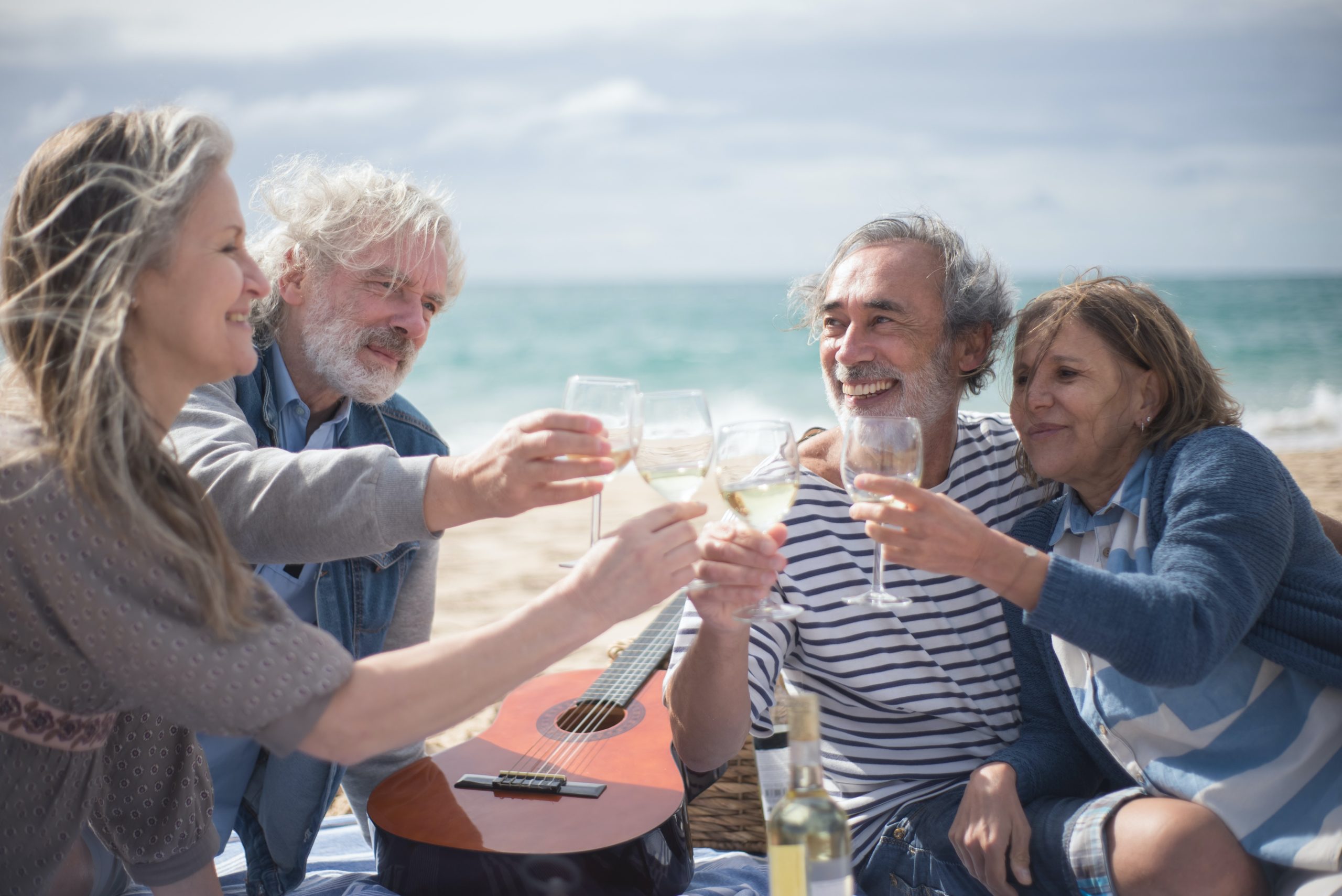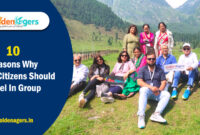Vacations for senior citizens offer a unique opportunity to explore new horizons, relax, and create lasting memories. This guide delves into the essential aspects of planning a fulfilling and safe trip, catering to the specific needs and preferences of older travelers. From choosing the right destination and accommodation to budgeting effectively and addressing health concerns, we provide comprehensive advice to ensure a memorable and enjoyable experience for every senior citizen.
We’ll cover a wide range of topics, including diverse vacation types suitable for various activity levels and mobility needs, senior-friendly destinations both domestically and internationally, practical budgeting strategies, crucial health and safety considerations, accessible transportation options, and the importance of choosing appropriate accommodations. The goal is to empower senior citizens to plan and enjoy vacations that are both enriching and stress-free.
Transportation and Accessibility for Senior Travelers
Planning transportation for a senior citizen’s vacation requires careful consideration of their individual mobility needs and preferences. The goal is to ensure a comfortable and stress-free journey, allowing them to fully enjoy their trip. Different modes of transport offer varying levels of accessibility and convenience.
Comparing Transportation Modes for Senior Travelers
Air travel, while often the fastest option, can be challenging for seniors with limited mobility due to long waits, potential for delays, and the need to navigate airports. Train travel generally offers more space and comfort, with accessible features often readily available. Car travel provides flexibility and control but requires careful planning regarding driving distances and potential fatigue. Cruises offer an all-inclusive experience with built-in transportation, but may present accessibility challenges depending on the ship and itinerary. The best choice depends heavily on the individual’s specific needs and the length of the trip.
Accessible Travel Options and Services
Many airlines, train companies, and cruise lines offer accessible travel options. These include wheelchair assistance at airports and train stations, priority boarding, accessible restrooms and seating, and assistance with baggage handling. For car travel, rental companies often provide accessible vehicles, and many hotels offer accessible rooms. Pre-booking these services is crucial to ensure availability and avoid last-minute complications. Travel insurance policies often include provisions for medical emergencies and trip interruptions related to mobility issues. Specific services and their availability should be confirmed directly with the relevant service provider.
Booking Accessible Travel Arrangements
A flowchart illustrating the process of booking accessible travel arrangements would begin with identifying the senior traveler’s specific mobility needs and travel preferences. This would be followed by researching and selecting appropriate transportation options, including airlines, train companies, or cruise lines with accessible services. The next step would involve contacting the chosen provider to request and confirm accessible arrangements, including wheelchair assistance, accessible seating, and any other necessary support. Once the arrangements are confirmed, the traveler should document the details and keep copies of confirmation emails or booking references. Finally, the traveler should confirm all arrangements closer to the departure date and prepare for a smooth and comfortable journey.
Accommodations for Senior Travelers
Choosing the right accommodations is crucial for a relaxing and enjoyable senior travel experience. The right environment can significantly impact comfort, safety, and overall well-being during a vacation. Careful consideration of accessibility and supportive features is paramount for ensuring a positive trip.
Selecting senior-friendly accommodations goes beyond simply finding a place to stay; it’s about prioritizing ease of movement, safety features, and amenities that cater to the specific needs of older adults. This proactive approach allows seniors to fully immerse themselves in their vacation, minimizing potential stress or discomfort.
Senior-Friendly Accommodation Features
Senior-friendly accommodations offer a range of features designed to enhance comfort and safety. These features minimize the challenges often associated with age-related mobility issues or health concerns. Accessible rooms, for example, provide ample space for wheelchairs or walkers, and strategically placed grab bars in bathrooms ensure stability. Emergency call systems offer peace of mind, providing immediate assistance if needed. Other desirable features include well-lit hallways and rooms, easy-to-reach light switches and electrical outlets, and comfortable seating options. Many establishments also offer options such as roll-in showers and adjustable beds.
Types of Senior-Friendly Accommodations
A variety of accommodation types cater to the needs of senior travelers. Resorts often offer specialized packages and amenities geared towards older adults, such as gentle fitness classes, accessible pools, and organized excursions. Hotels increasingly incorporate accessibility features into their design and services, providing options like accessible rooms and on-site assistance. Vacation rentals, such as accessible apartments or villas, offer a greater sense of independence and home-like comfort, often allowing seniors to tailor their stay to their preferences. Many offer adaptable features like ramps or wider doorways, ensuring easier navigation.
Questions Seniors Should Ask When Booking Accommodations
Before booking accommodations, seniors should verify the availability of specific features that cater to their needs. They should confirm the presence of accessible rooms, inquire about the availability of grab bars in bathrooms, and verify the existence of emergency call systems in the rooms. Asking about the presence of ramps or elevators is also crucial, and inquiring about the proximity of amenities like restaurants and recreational facilities can greatly enhance the experience. Additionally, it is beneficial to ask about the availability of accessible transportation options within the property or nearby. Finally, clarifying the hotel’s or rental’s policies regarding assistance with luggage or other special requests provides a clearer picture of the level of support offered.
Packing Essentials for Senior Travelers
Planning a trip requires careful consideration, especially for senior travelers. Packing efficiently and strategically can significantly enhance comfort and reduce stress during the journey. This section details essential items to pack, focusing on practicality and ease of access.
Packing light is crucial for senior travelers, minimizing strain during airport transfers and navigating unfamiliar environments. Choosing comfortable and functional clothing is equally important, ensuring mobility and adapting to various climates. Efficient luggage organization simplifies access to essential items throughout the trip.
Essential Medications and Medical Supplies
Before packing, consult your physician for travel advice and to ensure you have adequate prescriptions. It’s vital to carry all necessary medications in their original containers, clearly labeled with your name and dosage instructions. Include a copy of your prescriptions and any relevant medical information, such as allergies or existing conditions. A small first-aid kit with bandages, antiseptic wipes, pain relievers, and any personal medical necessities should also be included. Consider carrying a list of emergency contacts and local healthcare providers.
- Prescription medications (with copies of prescriptions)
- Over-the-counter pain relievers (e.g., ibuprofen, acetaminophen)
- Antacids or digestive aids
- Motion sickness medication (if needed)
- Bandages, antiseptic wipes, and other first-aid supplies
- Any personal medical devices (e.g., inhaler, CPAP machine)
Clothing and Footwear
Comfortable and functional clothing is paramount. Opt for loose-fitting, breathable fabrics that are easy to layer. Choose clothing items that are wrinkle-resistant and easy to care for, reducing the need for extensive ironing or dry cleaning. Comfortable walking shoes are essential, as are supportive socks to prevent blisters. Pack versatile items that can be mixed and matched to create various outfits.
- Lightweight, breathable shirts and pants
- Comfortable walking shoes (broken in before the trip)
- Supportive socks
- Layers for varying temperatures (sweater, light jacket)
- Underwear and pajamas
- Rain jacket or poncho
Personal Care Items and Toiletries
Pack travel-sized containers of essential toiletries to minimize weight and comply with airline regulations. Consider including items such as sunscreen, insect repellent, lip balm, and any personal care products you regularly use. Remember to pack any necessary assistive devices such as glasses, hearing aids, and canes. A small, lightweight toiletry bag will help keep these items organized and easily accessible.
- Travel-sized toiletries (shampoo, conditioner, soap, etc.)
- Sunscreen and insect repellent
- Lip balm
- Medications for allergies or other conditions
- Eyeglasses and/or hearing aids
- Any personal assistive devices (cane, walker)
Efficient Luggage Organization
Organize your luggage to ensure easy access to essential items. Keep medications, important documents (passport, tickets, insurance information), and any frequently needed items in a readily accessible carry-on bag. Use packing cubes or other organizers to separate clothing and other belongings. Consider using a wheeled suitcase to minimize physical strain during travel. Label your luggage clearly with your name and contact information.
Social and Companionship Aspects of Senior Vacations
Vacations offer a unique opportunity for senior citizens to enhance their social lives and combat feelings of loneliness, often exacerbated by retirement or changes in living arrangements. The structured environment and shared experiences of travel, especially group travel, can foster new friendships and strengthen existing bonds, leading to improved mental and emotional well-being. This section will explore the advantages of group travel for seniors and discuss ways travel can promote social interaction.
Group travel offers numerous benefits for seniors, providing a supportive and engaging environment conducive to socialization. The shared experiences and planned activities create natural opportunities for interaction and bonding among participants. Furthermore, the logistical aspects of travel, such as transportation and accommodation, are handled by the tour operator, reducing stress and allowing seniors to focus on enjoying the company of others.
Benefits of Group Travel for Seniors
The structured nature of group tours minimizes the planning and logistical burden often associated with independent travel, making it a more accessible and enjoyable option for seniors. Pre-arranged itineraries provide a sense of security and predictability, while the presence of a tour guide and fellow travelers fosters a sense of community and shared experience. This can be particularly beneficial for seniors traveling alone or those who may feel less confident navigating unfamiliar environments independently. The social interaction inherent in group travel can help combat feelings of isolation and loneliness, promoting a sense of belonging and connection.
Suitable Group Tour Operators for Seniors
Several reputable tour operators specialize in catering to the specific needs and preferences of senior travelers. These operators often offer itineraries designed with seniors’ physical abilities and interests in mind, incorporating slower paces, comfortable accommodations, and accessible transportation. They may also provide assistance with activities of daily living, such as meal planning and medication management, as needed. Researching and selecting a tour operator with a strong reputation for senior-friendly travel is crucial to ensuring a positive and enjoyable experience. Examples of such operators often include those specializing in adventure travel adapted for seniors or those focused on specific interests like historical sites or cultural immersion, allowing seniors to combine their passions with social interaction.
Travel as a Tool to Enhance Social Interaction and Combat Loneliness
Travel, in general, provides opportunities for social interaction that can significantly improve the mental and emotional well-being of senior citizens. Exposure to new environments, cultures, and people stimulates the mind and can alleviate feelings of isolation. The shared experiences of a vacation, whether it’s exploring a historical site, enjoying a scenic hike, or participating in a cooking class, create opportunities for conversation and connection with fellow travelers or locals. Furthermore, the anticipation and planning stages of a vacation can also be a source of social interaction, as seniors may discuss their travel plans with friends and family, generating excitement and shared experiences.
Activities Promoting Social Interaction During Senior Vacations
A variety of activities can be incorporated into senior vacations to foster social interaction and create lasting memories. Examples include:
- Group dinners or meals: Shared meals provide a relaxed and informal setting for conversation and bonding.
- Organized excursions and tours: Guided tours offer opportunities for shared experiences and discussions.
- Social gatherings and events: Planned social events, such as cocktail hours or game nights, provide structured opportunities for interaction.
- Workshops and classes: Participating in cooking classes, art workshops, or language lessons can foster a sense of community and shared learning.
- Volunteer opportunities: Engaging in volunteer activities during a vacation can be a rewarding way to connect with the local community and meet new people.
These activities provide structured opportunities for social interaction, reducing the pressure on seniors to initiate conversations or activities independently. The shared experiences create a sense of camaraderie and belonging, contributing to a more fulfilling and enriching vacation experience.
Conclusion
Planning a vacation as a senior citizen doesn’t have to be daunting. By carefully considering the factors discussed – from choosing the right type of vacation and destination to prioritizing health and safety, and ensuring accessible accommodations and transportation – you can create a truly memorable and rewarding experience. Remember, the goal is to enjoy a well-deserved break, explore new places, and reconnect with loved ones or embrace new adventures. With thoughtful planning, your senior vacation can be the trip of a lifetime.




